APSAA 亞太永續行動獎(Asia-Pacific Sustainability Action Awards )-Sustainability Action Award SDG3:Silver
International Cooperation and Development 財團法人國際合作發展基金會

Public Health Emergency Response System Enhancement Project in St. Vincent and the Grenadines
The International Cooperation and Development Fund (TaiwanICDF), MacKay Memorial Hospital (MMH) of Taiwan, and Ministry of Health, Wellness and Environment (MOHWE) of Saint Vincent and the Grenadines (SVG) initiated the four-year Public Health Emergency Response System Enhancement Project in SVG in 2021 to strengthen the country’s response capabilities during public health emergency incidents. The project leverages a holistic and innovative three-tier strategy that intervenes at government, institution and community levels. It integrates public-private resources to improve the central government’s inter-agency operations and communications and then form evidence-based policies. These public-private resources include those of health, police and fire agencies. In addition, the project uses the Training of Trainers (ToT) model to strengthen personnel capacities with emergency medical technician (EMT) training, build up institutional capacities with emergency care equipment, and raise public awareness of public health emergency response with educational materials.
By the end of 2022, the Chief Medical Officer and Health Security Director of MOHWE visited Taiwan to observe our emergency response systems, and they were impressed by how we utilized digital tools to coordinate inter-agency operations and communications. This built up their confidence in our professional emergency response system and helped convince them to fully support and facilitate all activities during project implementation. Later, ten seed instructors from health, police and fire agencies received pre-hospital emergency care training in Taiwan, which they shared with others while conducting a pre-hospital emergency care workshop under the ToT model. In total, 25 participants completed this EMT-1 training. Moreover, 16 participants joined and passed basic life support (BLS) training and received American Heart Association (AHA) certifications, and they will take advanced cardiovascular life support (ACLS) training in early 2023. We have seen improved skills and knowledge and received positive feedback from both participants and their supervisors. For example, two Taiwan-trained instructors were dispatched to manage a mini-bus accident. According to their supervisor, their on-site command and first aid skills had noticeably improved. Moreover, two other instructors were selected as assistant instructors for mass casualty management system training conducted by the Pan America Health Organization (PAHO). Finally, through local news and social media, public awareness of public health emergency response was raised at the community level.
Following these successes, an increasing number of public servants and citizens recognized this project and inquired about joining our training sessions. As a result, this project has come closer to its goal and is contributing to Sustainable Development Goal (SDG) Target 3.8 (“Achieve universal health coverage, including access to quality essential health care services”) and Target 3.d (“Strengthen the capacity of all countries, in particular developing countries, for early warning, risk reduction and management of national and global health risks”).
By the end of 2022, the Chief Medical Officer and Health Security Director of MOHWE visited Taiwan to observe our emergency response systems, and they were impressed by how we utilized digital tools to coordinate inter-agency operations and communications. This built up their confidence in our professional emergency response system and helped convince them to fully support and facilitate all activities during project implementation. Later, ten seed instructors from health, police and fire agencies received pre-hospital emergency care training in Taiwan, which they shared with others while conducting a pre-hospital emergency care workshop under the ToT model. In total, 25 participants completed this EMT-1 training. Moreover, 16 participants joined and passed basic life support (BLS) training and received American Heart Association (AHA) certifications, and they will take advanced cardiovascular life support (ACLS) training in early 2023. We have seen improved skills and knowledge and received positive feedback from both participants and their supervisors. For example, two Taiwan-trained instructors were dispatched to manage a mini-bus accident. According to their supervisor, their on-site command and first aid skills had noticeably improved. Moreover, two other instructors were selected as assistant instructors for mass casualty management system training conducted by the Pan America Health Organization (PAHO). Finally, through local news and social media, public awareness of public health emergency response was raised at the community level.
Following these successes, an increasing number of public servants and citizens recognized this project and inquired about joining our training sessions. As a result, this project has come closer to its goal and is contributing to Sustainable Development Goal (SDG) Target 3.8 (“Achieve universal health coverage, including access to quality essential health care services”) and Target 3.d (“Strengthen the capacity of all countries, in particular developing countries, for early warning, risk reduction and management of national and global health risks”).

